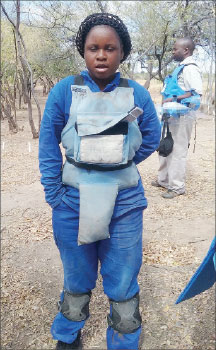
Often regarded as the weaker sex and fainthearted, women have always been relegated to the terraces, while men, considered as macho, have had the indulgence to tackle any feat that requires brawn.
BY PHYLLIS MBANJE
But winds of change have swept across the globe and exorcised the “demon” that entrapped many capable women.
De-mining, until lately, has been a male-dominated space. A tedious process, requiring tact and precision, it is no wonder many females shied away, but that too has changed.
Munei Gandari (28) from Rokodzo Village in Mukumbura is one of the few women who have dared to join their male counterparts in clearing their communities of landmines.
During a recent media tour of Mukumbura, NewsDay caught up with Gandari in one of the landmine-infested fields.
She looked snug in her blue work suit, her chubby face breaking into a grin, as she ambled over to meet the visitors.

Gandari wore the same bulky boots and heavy de-mining vest as her male colleagues, but did not seem fazed at all.
- Chamisa under fire over US$120K donation
- Mavhunga puts DeMbare into Chibuku quarterfinals
- Pension funds bet on Cabora Bassa oilfields
- Councils defy govt fire tender directive
Keep Reading
As she speaks about her mission, she comes across as confident and comfortable in her place alongside other male de-miners.
“For me, it is not about being a woman or a man. This is our land, we need it for growing crops and grazing our livestock,” she says casually.
Shoving one hand into her pocket, Gandari says she did not struggle on deciding to be a deminer.
“I heard from the other villagers that there was an organisation (Halo Trust) recruiting de-miners. I didn’t even consult anyone, I simply signed up for the training,” she says. But Gandari’s mother was horrified by the idea and threw a huge tantrum over the matter.
“You should have seen my mother’s face when I told her what I had done,” she giggled mischievously.
Her mother understandably raved and ranted about how dangerous it was and that it was no place for a woman.
“She was worried about all the men that I would be working with and what the neighbours would say,” Gandari explains.
But the rewards have paid off because Gandari can now look after her family and is even building herself a proper two-roomed cottage.
“I have managed to put food on the table and my siblings are all in school. I can also pamper myself with small luxury goods whenever I can,” she grins.
The landmines in Zimbabwe date back to the liberation war of the 1970s, when hundreds of kilometres of barrier minefields were laid along the borders with Zambia and Mozambique, to prevent insurgents from moving in and out of the country for training and re-supply.
There still remain very dense and unfenced minefields close to houses, schools and clinics and access to agricultural land is denied to small scale farmers.
According to Halo Trust, a de- mining organisation working in 15 countries, livestock are killed weekly and communities are separated from their primary water sources.
It is estimated that over 1 550 people have lost their lives or have been injured by mines since the war.
“The most dangerous areas are around seven metres from the road and although we have cleared most of these red spots, there remains a few that we are currently working on,” Halo’s de-mining manager, July Knowledge says.
Ferreting out a landmine is a lot of hard work requiring gallons of patience.
“We use a metal detector and when we pinpoint the exact place where the landmine lies, we carefully dig around it,” Gandari explains, as she waves goodbye and scuttles back to the hole she is working on.
Without hesitation, but ever so gently, she scraps away dirt. The process can take up to 30 minutes and in the sweltering heat, one can imagine how uncomfortable it must be.
Now fixated on the task at hand, Gandari loses track of her visitors. It is just her and the landmine.
With the safety helmet pulled low over her face, she keeps at it, never faltering or slackening up. “We have quite a number of female de-miners and our policy offers equal opportunity to women,” Halo Trust’s programmes manager, Tom Dibb says.











